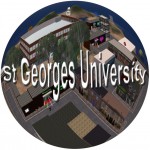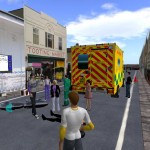 St George’s, University of London have been looking at Virtual Worlds, in particular Second Life, for a number of projects. Our main interest has been to deliver Virtual Patients as problem-based learning scenarios; these projects include Preview, G4 and Pivote. Our island is free for all to visit and the orientation maze has been a particular interest for newcomers of Second Life.
St George’s, University of London have been looking at Virtual Worlds, in particular Second Life, for a number of projects. Our main interest has been to deliver Virtual Patients as problem-based learning scenarios; these projects include Preview, G4 and Pivote. Our island is free for all to visit and the orientation maze has been a particular interest for newcomers of Second Life.
 Click here or on globe to teleport to the St George’s island.
Click here or on globe to teleport to the St George’s island.
Click here or on button to get more information about the Orientation Maze.
Second Life Demo Videos:
An Overview of Scenario-Based Learning in Medicine:
Publicity Material:
Medical News Today Website: http://www.medicalnewstoday.com/articles/125259.php
The Guardian: http://www.guardian.co.uk/education/2009/apr/21/elearning-university-of-london
The BBC News: http://news.bbc.co.uk/1/hi/health/7686595.stm
G4
 The G4 project aimed at replacing the typical paper-based linear patient cases with interactive branched Virtual Patients online. One of these cases was transformed into a Virtual Worlds case.
The G4 project aimed at replacing the typical paper-based linear patient cases with interactive branched Virtual Patients online. One of these cases was transformed into a Virtual Worlds case.
More information about the Virtual Worlds case here.
PREVIEW
 Preview is a JISC funded project to deliver Problem-Based Learning (PBL) for students via the virtual environment Second Life. Virtual World environments offer new possibilities of the ways in which PBL can be delivered. For these reasons PREVIEW aimed to investigate, implement and evaluate the use of Virtual Worlds to create and deliver immersive, collaborative PBL tutorials.
Preview is a JISC funded project to deliver Problem-Based Learning (PBL) for students via the virtual environment Second Life. Virtual World environments offer new possibilities of the ways in which PBL can be delivered. For these reasons PREVIEW aimed to investigate, implement and evaluate the use of Virtual Worlds to create and deliver immersive, collaborative PBL tutorials.
More information here.
PIVOTE
![]() PIVOTE is a virtual learning authoring system for virtual worlds. It was developed as part of the PREVIEW project. The system could be used for any sort of structured learning in virtual worlds.
PIVOTE is a virtual learning authoring system for virtual worlds. It was developed as part of the PREVIEW project. The system could be used for any sort of structured learning in virtual worlds.
Key Points:

- All the structure and information content of an exercise is stored on the web, not in the virtual world which means that it is easy to create, to edit and to maintain courseware independent of Virtual World.
- You can have the same exercise but with different levels of student information.
More information here.
Virtual Training for Psychosis
 The aim of this project was to develop a teaching scenario for psychiatry students that will allow them to:
The aim of this project was to develop a teaching scenario for psychiatry students that will allow them to:
- simulate a home visit for a psychiatry patient,
- practice dealing with distressed and disturbed patients,
- practise history taking from such patients,
- go through a simulation of a similar psychosis in order to gain a better understanding of what such patients may experience
More information here.
